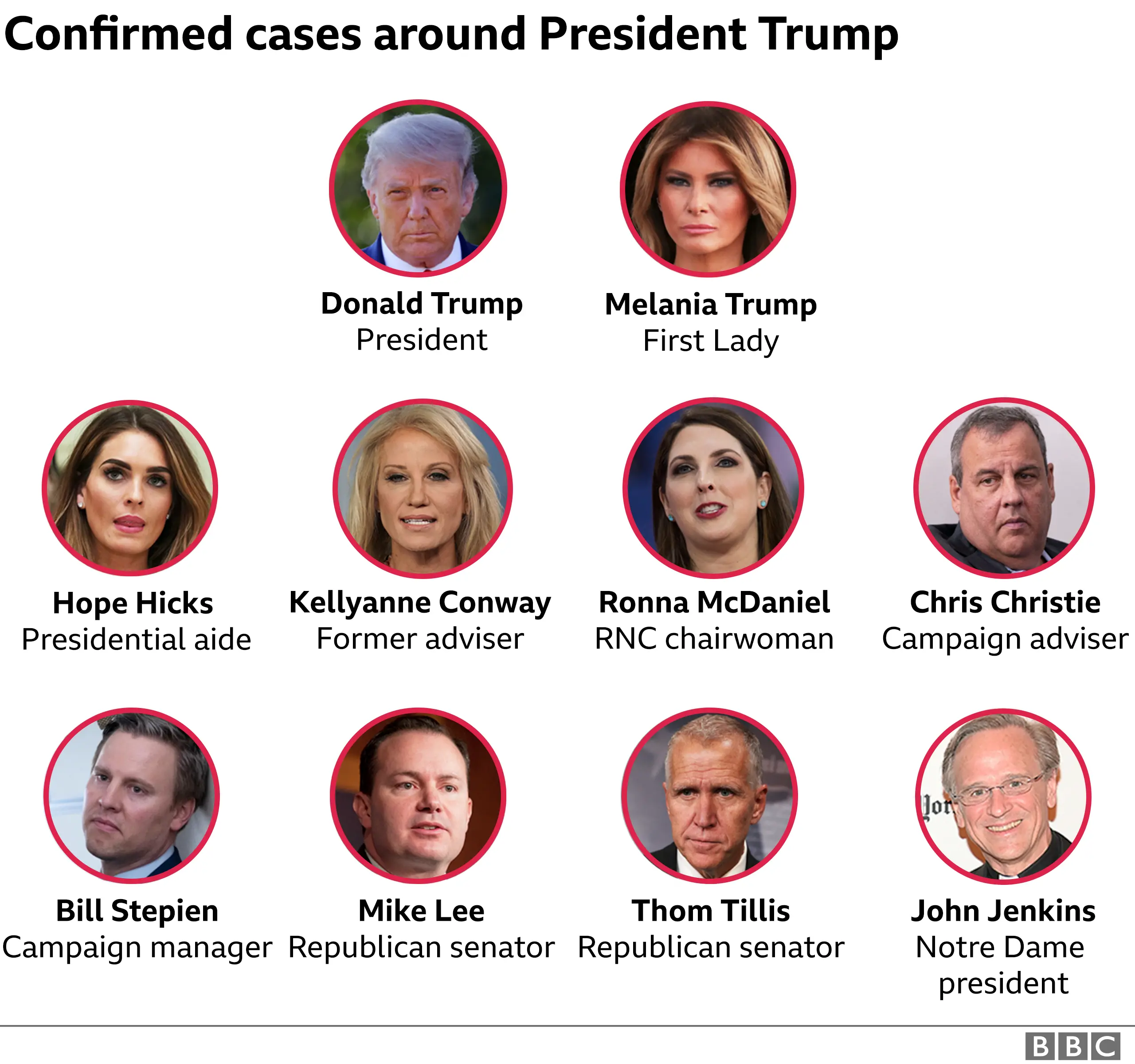Why won't White House say when Trump had last test?

It was only last week that we learned that Donald and Melania Trump had tested positive for the novel coronavirus. Since then, the president has been admitted to hospital and a growing number of senior government officials and aides have themselves tested positive.
As it now stands, there are a number of important questions that remain unanswered. How these questions are resolved could hold the key to understanding how much damage the virus will do to this president - to his health, his reputation and his political standing.
When did Trump last receive a negative test?
This is now THE burning question, after doctors on Monday again batted it away.
It's a simple one to answer, or at least it should be. The reason it's important is that by not answering it, there's a suggestion that the official story may not be accurate.
The official line from the White House is that the president began to feel ill on Thursday evening, tested positive and then announced his results in that late-night tweet.
Knowing the exact timeline, including when he was tested and what their results have been, would help lend clarity to the question of whether there was ever any effort by the White House or the president himself to conceal his condition.
The silence could mean he wasn't getting tested as regularly as he should have been, or it could mean there was a positive test earlier than we thought.
Further complicating matters, on Saturday White House physician Sean Conley said that the president's diagnosis came "72 hours ago" - which would have been Wednesday, before the president's Minnesota rally that night and that Thursday trip.
The White House subsequently issued a statement saying the physician "misspoke" and meant that the president was in his "third day" with the disease.
Medical experts think the speed at which Trump's health deteriorated on Friday - just hours after his reported diagnoses - could indicate that the president may have contracted the virus much earlier.
Do we know all the facts about his health?
The White House and medical team have been equally opaque about the exact nature of Mr Trump's condition.
On Friday, we were told the president's symptoms were "mild". Since then, we have learned that on Friday he was running a "high" fever and had sufficient difficulty breathing that he required supplemental oxygen.
On Saturday, Dr Conley told reporters that the president was doing "very well" and the medical team was "very happy" with the progress he was making. Immediately after, Chief of Staff Mark Meadows told reporters the president's vitals had been "very concerning" and he was "not on a clear path to a full recovery".
On Sunday, Conley attempted to explain that stark discrepancy, saying "I didn't want to give any information that might steer the course of illness in another direction" - a strange phrase, given that the illness will run its course regardless of the medical team's public statements.
There have been other unusual items that suggest the medical team is being less than forthcoming about the president's health.
For instance, on Sunday Conley said the president, in addition to taking an antiviral cocktail, had been given dexamethasone - a steroid usually prescribed for "severe and critical" Covid-19 cases. He said the president had again experienced a dip in blood-oxygen levels on Saturday, but would not say exactly how low they got.
The president, because of his age and medical history, is in a higher-risk group for complications from the novel coronavirus. It would not be surprising if his physicians outlined an aggressive treatment for the nation's leader, but a shifting set of facts and explanations could undermine the trust the public has in their statements.
Should Mike Pence be isolating?
Meanwhile, the vice-president, who is next in line for the presidency if something were to happen to Trump, has so far declined to go into quarantine despite the possibility that he had been exposed to the virus, as well.
Mr Pence and his wife Karen received negative results on Sunday - their third negative test this week. The incubation period of the virus can be up to 14 days, however, so the test still does not guarantee the vice-president is not infected.

For months Trump had tempted fate by making numerous public appearances and downplaying the need to wear a mask, and the odds finally caught up. Pence's plan to continue campaigning this week suggest that lessons seemingly learned the hard way may not have been learned at all.
Trump campaign senior adviser Jason Miller said on Sunday that Pence is "going to have a very full aggressive schedule as will the first family". In the NBC News "Meet The Press" interview he insisted that he had "no concerns at all" about it.
Why have they been so slow to contact trace?
The past nine months have shown that the virus works on its own schedule and it is often at its most dangerous when people - individuals, society, government - let down their guard.
Last Saturday's announcement ceremony for Trump's Supreme Court nominee, Amy Coney Barrett, was a prime example. Held in the Rose Garden and followed by an indoor reception, the occasion is being investigated as a possible super-spreader event.
Video shows attendees speaking and hugging while not wearing masks. Besides the president and first lady, at least five other attendees, seated in the front rows close to Vice-President Pence, have subsequently tested positive.
 Getty Images/BBC
Getty Images/BBCOn Sunday, Monday and Tuesday of last week, the president held lengthy meetings indoors to prepare for his Tuesday debate with former Vice-President Joe Biden. Four members of those meetings - the president, campaign manager Bill Stepien, former New Jersey Governor Chris Christie and adviser Hope Hicks - have tested positive. (Former New York Mayor Rudy Giuliani and advisers Stephen Miller and Jason Miller are negative so far.)
Despite these episodes of repeated exposure for the president and his senior aides, however, the administration has seemed lackadaisical about conducting a thorough contact-tracing programme.
According to the Washington Post, many of the individuals who attended events with the president over the last week, have yet to be contacted by the government health officials. White House employees themselves have not received clear instructions about whether to self-isolate and what their own exposure may have been.
As each day goes by, more senior government officials - in the administration and Congress - are reporting positive tests for the novel coronavirus. Washington's corridors of power have become only the latest hotspot in a nation where more than 209,000 have died from the Covid-19.
There are guidelines and processes for identifying exposure and controlling the spread. If the government is following them, it has not been forthcoming about its efforts.
